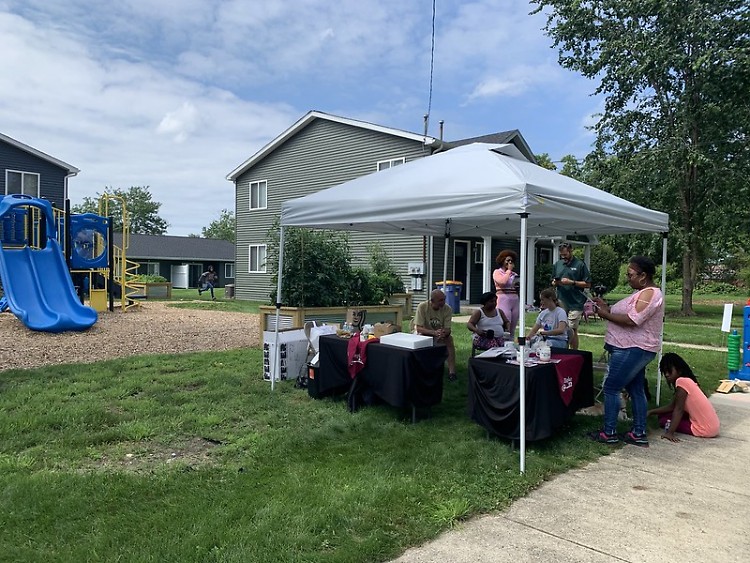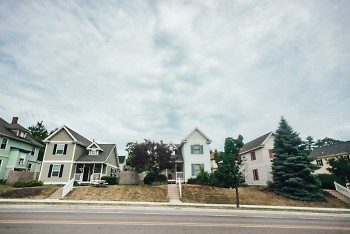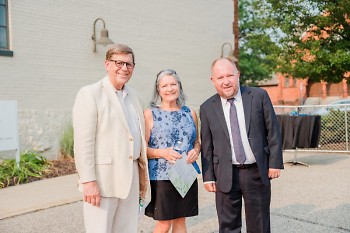“Becoming a homeowner is a way to build equity as an asset that can increase a person’s wealth. The added benefit is the investment provides an established place to live,” says Tammy Karas, the Branch Officer of the United Bank’s downtown Grand Rapids branch. The Dwelling Place Regional Community Land Trust (DPCLT) seeks to address racial and economic disparities by making homeownership more accessible to people who have historically been denied the opportunity.
The DPCLT’s wealth-building aspect is one of the things that drew Tabitha Edmonds, long-time Dwelling Place renter, to this affordable homeownership opportunity, “The investment [means] I have more money going towards owning, and as a result more money coming back to me.” Edmonds is currently going through the process to own her home via the DPCLT, and is excited about making the space her own, “it’s personable, where I can put my own special touches to it, it’s basically freedom.”
Access to financial freedom is as much about awareness as it is about opportunity. Dwelling Place has done outreach to spread the word about the CLT via phone calls to interested persons, weekly orientations, door-knocking, flyering at farmers markets, and providing information to local and statewide businesses/organizations. Dwelling Place’s Community Building and Engagement Department has also facilitated three engagement events at and around being converted to the CLT model to make sure current renters have priority to this new financial model.
touted as a way to decrease racial and economic disparities in the rates of homeownership.“You look at years and years of discrimination against people of color in the housing market, to try to even that playing field is incredibly important, it’s going to be a tremendous effort and it's going to take a long time” remarks Lee Nelson Weber, DPCLT Board Chair and former Executive Director of the Fair Housing Center of West Michigan. Tammy Karas, who, with her banking expertise serves as a volunteer financial coach for Dwelling Place’s “Mindful Money Program,” adds, Discriminatory practices can limit access to the opportunity of accumulating wealth through homeownership.” The Community Land Trust Model offers an opportunity to repair some of this damage. “It allows people who wouldn’t necessarily have the funds to get into a home [in the traditional market], to get a home. It also helps build a little bit of equity down the road so CLT homeowners can begin to build some sort of generational wealth” says Floyd Wilson Jr., Chief Development Officer for Pinnacle Construction.
- 74.2% non-Hispanic white adults are homeowners
- 58.7% Asian, Native, Hawaiian and Pacific Islander adults are homeowners
- 47.5% Hispanic adults are homeowners
- 44.6% Black adults are homeowners
The need for affordable housing and homeownership is only growing. “We’re trying to help bridge the gaps for affordable housing by working with places like Dwelling Place. We see their values aligning to our values and principles and how we try to dignify people,” remarks Wilson Jr. Dwelling Place has partnered with Pinnacle to build 45 new single-family homes for the DPCLT, set to break ground in 2022. To learn if you apply to be a CLT homebuyer, visit Dwelling Place’s website and schedule a meeting with Dave DeVelder, Director of the Dwelling Place Community Land Trust.
With a mission to improve the lives of people by creating quality affordable housing, providing essential support services and serving as a catalyst for neighborhood revitalization, Dwelling Place serves families and people in 4 counties across West Michigan. Dwelling Place is powered by volunteers and numerous staff persons; guest writers create our Rapidian content. Thanks to Americorps VISTA Kiley Lowery for her contribution of this piece.
The Rapidian, a program of the 501(c)3 nonprofit Community Media Center, relies on the community’s support to help cover the cost of training reporters and publishing content.
We need your help.
If each of our readers and content creators who values this community platform help support its creation and maintenance, The Rapidian can continue to educate and facilitate a conversation around issues for years to come.
Please support The Rapidian and make a contribution today.


